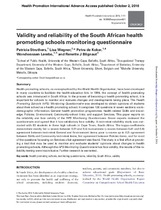Validity and reliability of the South African health promoting schools monitoring questionnaire
Date
2016Author
Struthers, Patricia
Wegner, Lisa
de Koker, Petra
Lerebo, Wondwossen
Blignaut, Renette
Metadata
Show full item recordAbstract
Health promoting schools, as conceptualised by the World Health Organisation, have been developed
in many countries to facilitate the health-education link. In 1994, the concept of health promoting
schools was introduced in South Africa. In the process of becoming a health promoting school, it is
important for schools to monitor and evaluate changes and developments taking place. The Health
Promoting Schools (HPS) Monitoring Questionnaire was developed to obtain opinions of students
about their school as a health promoting school. It comprises 138 questions in seven sections: sociodemographic
information; General health promotion programmes; health related Skills and knowledge;
Policies; Environment; Community-school links; and support Services. This paper reports on
the reliability and face validity of the HPS Monitoring Questionnaire. Seven experts reviewed the
questionnaire and agreed that it has satisfactory face validity. A test-retest reliability study was conducted
with 83 students in three high schools in Cape Town, South Africa. The kappa-coefficients
demonstrate mostly fair (j-scores between 0.21 and 0.4) to moderate (j-scores between 0.41 and 0.6)
agreement between test-retest General and Environment items; poor (j-scores up to 0.2) agreement
between Skills and Community test-retest items, fair agreement between Policies items, and for most
of the questions focussing on Services a fair agreement was found. The study is a first effort at providing
a tool that may be used to monitor and evaluate students' opinions about changes in health
promoting schools. Although the HPS Monitoring Questionnaire has face validity, the results of the reliability
testing were inconclusive. Further research is warranted.

